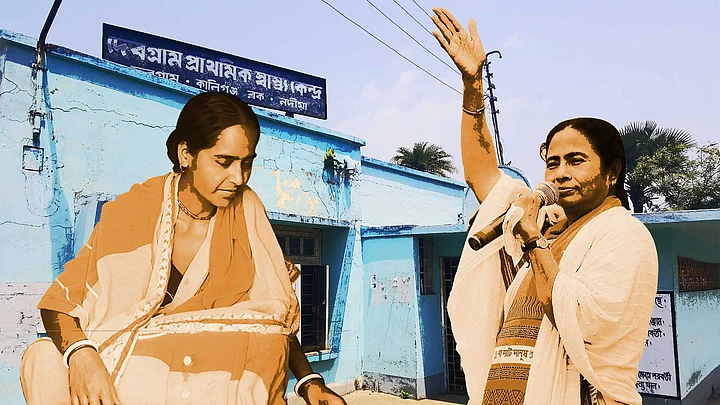On a blistering June afternoon, 21 years ago, Malati Das, then in her teens, watched helplessly as her 11-month-old daughter Bandana died in her arms. Two other infants in two nearby hamlets also died in a span of a couple of hours.
The cause of the three deaths was a contaminated polio vaccine administered by a doctor who manned the public health centre (PHC) in Debogram in West Bengal’s Nadia district.
As news of the death spread, the villagers of Debogram took the law into their hands, setting the PHC on fire and rampaging through the paltry medicine stock before calm was restored by a rag-tag police force.
The deaths jolted the lethargic CPI(M)-led Left Front regime in Calcutta, forcing the then Health Minister Prasanta Sur to rush to Debogram to assuage the angry villagers.
An Early Saviour in Mamata
But even before Sur could reach Debogram, Mamata Banerjee, who was shaping up to be a fiery Congress leader, had quietly slipped into the village to be by the side of the grieving families and agitated villagers.
Debogram did not forget its debt of gratitude to Mamata, voting overwhelmingly for her in the 2011 assembly polls that swept the CPI(M) out of power.
As Debogram, a part of Nadia’s Kaliganj constituency awaits its turn to vote on 17 April, Malati, now 36, is rueing whether “she (Mamata) deserves my vote.” She is reminded of the day she watched little Bandana die because of the PHC doctor’s callousness and how “Didi stood by” her side, “and the other two families then.”
As Malati failed to hold back the searing tears that pooled in her large, sad eyes, her husband, Bishnu narrated the story of another tragedy that the couple suffered.
A year-and-four-months ago, their strapping 18-year-old son committed suicide. “I have two daughters, one in class V and the other in class X, and I have to marry them off,” Bishnu said.
The Poriborton Parables
There has been some poriborton – some streets lamps have come up, the village has a mandi, a college where classes haven’t begun. But so what?Bishnu
The PHC was upgraded to a modest government hospital – now with its usual coat of an obsessed Mamata’s white-and-blue paint – long before the Trinamool supremo took Bengal by storm.
But most of the time, the doctors are missing or too busy in private practice. So we still end up travelling to Krishnanagar, 43 km from Debogram.Bishnu
In 2011, the TMC took all but two of Nadia’s 17 assembly seats, bringing hope to Debogram’s residents and a promise of a better future under Mamata’s regime. But at the end of five years of TMC rule, Bishnu said he “now has to think” before voting, which he didn’t have to in 2011, “as every voting-age man and woman” in his village “turned out to vote for her”.
So what has gone wrong now? Bishnu’s cousin Sujit, cradling his seven-month-old daughter in his arms, said wistfully: “The Trinamool activists in these parts are not quite civil.” Sujit, of course, would not say directly that the TMC workers are local toughs who live off extorting the poor villagers.
Whither Employment?
With the sun directly overhead, the atmosphere around the Das’ thatched tenement had eased sufficiently by now, enough for Bishnu to offer us tea which arrived in a small kettle whose snout poured out the syrupy-sweet beverage in dinky plastic cups that he fetched from a nearby tea stall. His kitchen did not have even small faux porcelain cups to serve tea to guests.
Bishnu is not quite on the economic margins. His skill is in setting up marquees for sundry functions. He is part of rural Bengal’s huge itinerant labour force that floats about within the state or travels across to other states – stretching from Bihar in the north to Andhra Pradesh in the south to Goa and Gujarat in the west – in search of jobs that have dried up in Nadia and its adjoining districts.
In his travels across India’s many states, Bishnu said he found “orderliness” in “not just the way matters of governance and extending benefits to the public” is concerned but also in the “quality of politics”.
Scratching his bald in frustration, Bishnu said:
But in Bengal, we now watch on TV TMC leaders pocketing wads of currency notes, something that never ever happened even in the last few dark years of the CPI(M)’s rule.Bishnu
Debogram is no longer the sleepy village of 21 years ago. It has a bustling market on National Highway-34. The village after Debogram is Palashi or Plassey, the site of the so-called battle of 1757 between the Robert Clive-led East India Company’s motley force and Nawab Siraj-ud-Daula’s 40,000-strong army. Siraj’s force was routed in Palashi’s battlefield, forever changing the course of Bengal – and India’s – history.
Will Debogram vote to reshape Nadia, if not Bengal’s future?
(At The Quint, we question everything. Play an active role in shaping our journalism by becoming a member today.)
